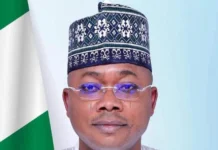President Muhammadu Buhari says there is need to put in place rules stipulating that criminal trials up to the Supreme Court must end in 12 months.
Laolu Akande, Senior Special Assistant to the President on Media and Publicity, Office of the Vice President, in a statement on Wednesday in Abuja, said Buhari virtually declared open Nigerian Bar Association’s (NBA) Annual General Conference.
News Agency of Nigeria(NAN) reports that Virtual 2020 Annual Conference with the theme, “Step Forward’’, coincides with the NBA”s body’s 60th anniversary.
Represented by Vice President Yemi Osinbajo, Buhari said that such reforms had become necessary given the current and pre-existing challenges confronting the system.
“Why can’t we have time limits for all cases?
“Why can’t we put in place the rules that will say that a criminal trial all the way up to the Supreme Court must end in 12 months, and that a civil trial must not exceed 12-15 months? I think that, for me, will be stepping forward.
“Step forward means taking responsibility. It may also mean making progress, boldly taking on the challenges of the future.
“I believe we need to step forward and resolve some of the nagging problems of our systems of administration of justice.”
The president referred to his experience at the Presidential Election Petitions Tribunals in 2003, 2007, 2011 and 2019.
He said until recently, court trials had been “terribly slow” and capable of frustrating genuine efforts aimed at promoting general progress of the society.
“I am not a lawyer but I have been both a casualty and a beneficiary of the judicial process. I was before the courts for two and a half years- 27 months from 2003 in the now famous case of Buhari and Obasanjo.
“ It took me two and a half years to fight for a four-year Presidential mandate.
“In 2007, I was again in court for 20 months, almost two years, also as petitioner and later then appellant in the case of Buhari and INEC.
“And in 2011, again as petitioner in the case of CPC and INEC. I spent another eight months in court. At the end, I lost all three cases. I wondered then why it needed to take so long to arrive at a verdict.
“In 2019, my status improved, I was now no longer petitioner, I became first respondent in the case of Atiku and Buhari and the whole process took barely six months.”
Buhari said that his second concern was the multiple and sometimes conflicting orders of courts.
He said that recently, his party had an internal crisis, adding that in the six-week period he chaired meetings to resolve the crisis, there were at least 10 different conflicting rulings of the courts across the country.
“Again, I am not a lawyer, but surely these sort of multiple and conflicting rulings of courts sometimes ex parte, really make a mockery of the judicial process.
“Third issue is the seeming bias towards technicality over the clear common sense justice of cases.
“If justice is to be seen to be done, then the outcomes of cases must make sense to the average person and not just to the refined minds of learned persons alone. Justice must make sense to lawyers and non-lawyers alike.
“My fourth issue is on the appointment of judges. I believe that we must continuously improve on the selection processes for appointment of the men and women who serve as judges.”
According to him, there is need to cast the nets wider in search of judges, especially at the appellate level.
He said that primarily merit-based selection processes including mandatory tests and interviews for all applicants for judgeships must be put in place.
“While our Constitution urges Federal character for balance, this is not an excuse for mediocrity.
“ If a particular zone is to produce a judge why can’t we find the best talents in that zone; our country has excellent men and women everywhere.
“Reform is urgent because the fabric of our society is stitched together by our system of justice and law enforcement; we cannot afford to have the stitches come undone,” he said.
Buhari urged stakeholders in the sector to further leverage technology.
Earlier in his remark, the Chief Justice of Nigeria, Justice Tanko Muhammad, restated the commitment of the judiciary to adapt to changes within and around its environment, citing the adoption of virtual court proceedings as an example.
He said the judiciary under his watch would not condone practices that had, over the years, negatively impacted the image of the justice sector.
Muhammad added that abuse of court processes, among others would no longer be tolerated.(NAN)




